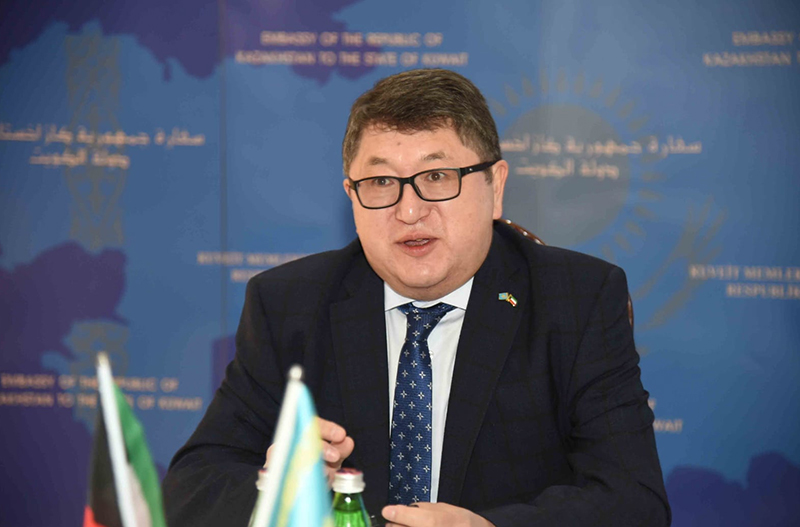The state is just; the nation is one; and society is prosperous’, is the slogan that guides the President of the Republic of Kazakhstan, Kassym-Jomart Tokayev, in leading constitutional reforms in the country, said Ambassador of Kazakhstan to Kuwait, H.E. Azmat Berdibay, during a media meet held at the embassy recently.
While elaborating on the political, economic and social reform programs of the president, Ambassador Berdibay added that his country’s political modernization is based on the formula, ‘The president is strong; the parliament is in force; and the government is accountable’.
Ambassador Berdibay described Kazakhstan’s bilateral relations with Kuwait as developing remarkably, and added that he expected to continue this path by strengthening ties through high-level visits between the two countries. He further stated that Kuwaitis are now being granted a 30-day stay in Kazakhstan, and there is a plan to increase their visa’s validity to open up opportunities for more Kuwaiti tourists to visit the country in the near future.
Ambassador Berdibay explained that the direct flights between Kazakhstan and Kuwait have contributed to an increase in trade between the two countries, specifically in the meat trade. He added that there is a great demand from Kuwaiti businessmen and investors to establish projects in Kazakhstan, and there is also a demand from Kazakh investors to implement projects in Kuwait. In addition, he noted that the volume of trade exchange, which last year accounted for around US$800,000 has grown to $3 million during the first eight months of this year, and is expected to increase significantly in the future.
On the other hand, regarding the political, and information sharing program between the two countries, Ambassador Berdibay said the first years of President Tokayev’s presidency were marked by the effective continuation of the political path of former President Nursultan Nazarbayev, and the preservation of all positive achievements made in the past and which aim to guarantee equality in the rights of all the citizens with regards to cultural and social practices, as well as create new opportunities for them.
He added that since the election of President Tokayev three and a half years ago, four political reform programs have been implemented under the slogan, ‘The state and the reformation’, in addition to reactivating all state institutions and the civil society, as well as implementing political modernization according to the basic formula. The president has also stressed the preservation of the sovereignty and territorial integrity of the country, as well as the adoption of constitutional rules to limit the president’s term to a single period of seven years without compromising the country’s leadership.
Ambassador Berdibay pointed out that the president had called for the early presidential elections, which are now scheduled for 20 November, stressing that the elections will be launched with a new electoral session. The ambassador added that a Constitutional Court will be established and will begin work in January 2023, while the Foundation of the Commissioner for Human Rights has acquired membership.
The ambassador also highlighted that constitutional reforms have been implemented which guarantee a 30 percent quota for women and youth in the partylists before the elections, and in the distribution of the mandate of representatives. In addition, the percentage of income for parties was reduced by 7 percent. He pointed out that constitutional reform is an integral part of the wide-ranging program of political modernization that President Tokayev has implemented since his election, pointing out that the approach of ‘New Kazakhstan’ is the president’s vision for the future of the country with a strong civil society on the principles of justice, honesty and hard work.
On the other hand, he referred to the results of the work of the Seventh Conference of Leaders of World and Traditional Religions, pointing out that the unity among religions and support for women are the most important part of recovery and a resource for the health of the state, as well as a guarantee for political stability and development of the country going forward.

